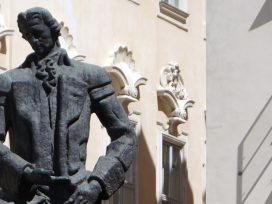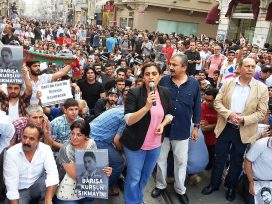
What happens to democracy when governments court the rich and highly skilled, offering citizenship as privilege, when those in need are turned away? This year’s Speech to Europe takes the concept of ‘good’ and ‘bad’ migrants to task.
Since the collapse of Novi Sad’s train station in November, student-led protests have erupted across Serbia, inspiring a nationwide movement against corruption.
For those not too familiar with the internal affairs of Serbia, let me introduce two key players from today’s conversation:
Aleksandar Vučić is a recurring character here. He has been in power in Serbia since 2012 in varying capacities, first as prime minister, later as president, and seems to have concentrated power very effectively. Vučić is not only a current-day autocrat, but a great survivor of a previous autocracy: his first major political appointment was as minister of information in 1998, under the Milosevic regime as it waged its genocidal war against its neighbors, known colloquially as the Yugoslav wars.
Vučić’s current reign has courted controversy from the get-go, and has been a subject of protests practically all along. The violent repression of free speech and political activities are not far from this government, and ballot fraud has been well documented in the country’s previous elections.
Now, crucially, Serbia is not a member of the European Union but has been a candidate for membership since 2012, a process that doesn’t seem to be going anywhere recently, but interestingly, also hasn’t deteriorated, despite the clear democratic erosion. Serbia’s sizable lithium deposits may play a role in this process.
But Serbia also has a strong recent history of protest: famously the Otpor! movement, literally meaning ’Resistance’. This movement formed at the same time as Aleksandar Vučić served as minister of information and gradually, incrementally organized political resistance against an even more violent regime in wartime. Today we discuss the legacy of Otpor! and the recent protest movements in Serbia today.
Our guests of today are:
Branka Ćurčić is a longtime cultural activist and co-founder of the Group for Conceptual Politics in Novi Sad. She edits the activist platform TENANT and has led numerous publishing and translation projects in critical theory and contemporary art.
Student protester Višnja Vukajlović is a third-year student of Scene Architecture, Technology, and Design at the Faculty of Technical Sciences in Novi Sad. She is currently one of the students participating in the blockade and strives to stay grounded and maintain a clear perspective throughout it all.
Aleksandar Reljić, a journalist and filmmaker born in Belgrade in 1974, works in the Documentary Department at Radio-Television of Vojvodina. Over his 20-year career, he has focused on documentaries about xenophobia, nationalism, war crimes, and inter-ethnic relations in the former Yugoslavia.
Dejan Tomka is an audio producer, activist, and media creator based in Belgrade, actively participating in the ongoing student-led protests across Serbia—both on the streets and through her online presence. He uses social media and sound to amplify voices calling for truth, justice, and democratic change
Thank you to the Foto Storm Media Podcast Studio for hosting us!
Standard Time talk show S2E19: The world beyond institutions
Réka Kinga Papp anchor
Daniela Univazo writer-editor
Merve Akyel art director, Eurozine
Szilvia Pintér producer
Julia Sobota captions and translations
Zsófia Gabriella Papp digital producer
Priyanka Hutschenreiter project manager
Judit Csikós head of finance
Réka Kinga Papp editor-in-chief
Csilla Nagyné Kardos office administration
Gergely Áron Pápai DoP
Bence Bodoky camera
István Nagy sound
Nóra Ruszkai video editor
István Nagy lead video editor
Milán Golovics dialogue editor
Dániel Nagy dialogue editor
Victor Maria Lima animation
Crypt-of-Insomnia theme music
Disclosure
This talk show is a Display Europe production: a ground-breaking media platform anchored in public values.

This programme is co-funded by the European Commission and the European Cultural Foundation.
Importantly, the views and opinions expressed here are those of the authors and speakers only and do not necessarily reflect those of the European Union or the European Education and Culture Executive Agency (EACEA). Neither the European Union nor the EACEA can be held responsible for them.

Published 30 May 2025
Original in English
Subscribe to know what’s worth thinking about.

What happens to democracy when governments court the rich and highly skilled, offering citizenship as privilege, when those in need are turned away? This year’s Speech to Europe takes the concept of ‘good’ and ‘bad’ migrants to task.

While lasting peace between the Turkish state and the Kurds now seems a genuine possibility, Ankara’s assault on democracy continues. Sırrı Süreyya Önder, the longtime dissident who died last year, remains a symbol of hope.